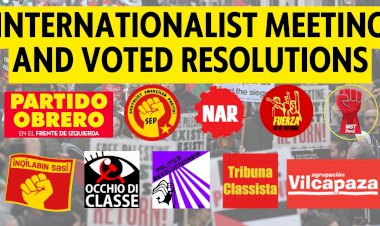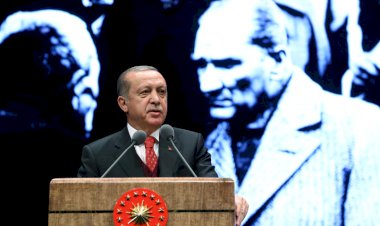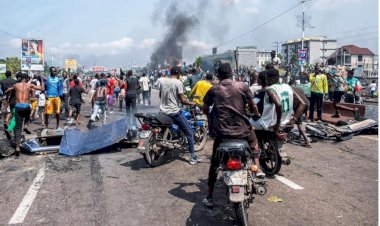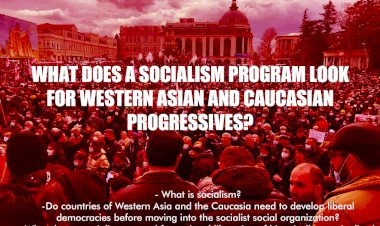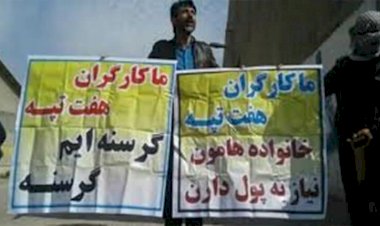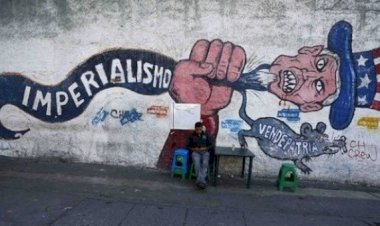Latin America in the Face of Imperialist War and Governments of Hunger Against the People
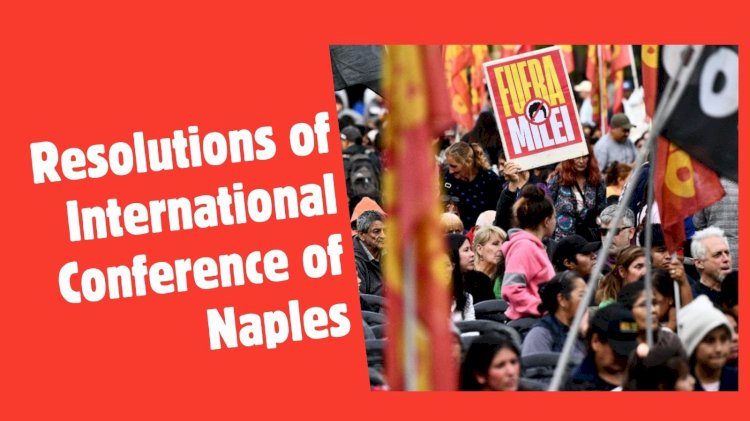
Resolution voted by the International Conference Against Imperialist War held in Naples (Italy)
The worsening global capitalist crisis is increasingly leading to diplomatic, political, and commercial inter-capitalist clashes and armed wars. Tendencies toward a world war are developing. The epicenter revolves around the US government's offensive, first and foremost against China and Russia, and also against the imperialisms of the European Union, Japan, and, of course, the backward and semi-colonial countries.
Without fully renouncing the false "freedom of trade"—used until recently to "open markets" in favor of imperialist capital—Trump has launched an aggressive "protectionist" policy of "tariffs," which also extends to Latin American countries. Mexico is the hardest hit, as is all of Central America, Colombia, etc. It is an attempt to regain the hegemony it has been losing.
This offensive is the US government's struggle to keep a lid on what it considers its "backyard" and align it against the advance of other capitalist powers on the continent, particularly China.
While the United States remains the main destination for Latin American exports, China is hot on its heels. Chile exports almost 40% to China, Brazil 32%, and Peru 30%. China is Argentina's second destination of exports (after Brazil).
Chinese investments are also growing rapidly, especially in public works linked to its new Silk Road plan (Chancay Megaport in Peru, Bogotá Metro in Colombia; plan for a railway crossing the continent between São Paulo, Brazil and Chancay, Peru; etc.).
Latin American countries are not progressing but rather "advancing" in the reprimarization of their economies. They export raw materials (Peru and Chile: copper, etc.; Argentina and Brazil: soybeans, etc.) and import manufactured goods to and from China.
The struggle between the US and China over Latin America is not a political/ideological struggle—against communism and authoritarianism, for democracy on the one hand, or anti-imperialism, for multilateralism on the other, as both capitalist sides claim in their respective propaganda—but rather for the economic domination and subjugation of these countries. Pro-Trump right-wing Latin American bourgeoisies, such as Bolsonaro in Brazil, or the current Milei government in Argentina, while ideologically and politically in agreement with Trump's fascist and warmongering policies (and systematically support them), do not renounce trade with China. They are "slaves" of their capitalist and landowning oligarchies, who do not want to lose significant revenues.
But the working people of the continent only win as a result of this trade, the inflation of prices on mass-market products, driven by international export prices (soybeans, wheat, meat, etc.). And the dollars earned from exports go toward paying off "foreign debts,"—which national bourgeoisies have also developed an interest in—and not toward national development.
The US’s offensive has been manifesting itself openly. Trump is imposing new controls on Panama to the detriment of China, which is being forced to sell the ports at the entrance and exit of the Interoceanic Canal. Treasury Secretary Bessent visited Milei, pressuring him to abandon financial agreements with China (a $15 billion swap), in return for the massive loan the IMF granted to save Argentina from a new default.
The Latin American bourgeoisies are increasingly pressured to align themselves with the United States against China, even to the detriment of any comparative advantages they might gain from these inter-capitalist confrontations. We reject the extortion of the US and the claim to veto power over the economy and trade in the region. We also oppose political alignment with the Chinese or Russian regimes or with the BRICS. We defend the political independence of the exploited Latin Americans. National and social liberation will not come from regimes that oppress their own workers and the nations under their influence, but from the socialist unity of Latin America, through workers' governments.
The CELAC Conference has just been held in Beijing with Chinese President Xi Jinping, where all (except for Milei 's Argentina ) signed a document in favor of trade "multilateralism" (against the Trump/tariff offensive); while in Miami, the same countries met at the Hemispheric Security Conference, reinforcing Latin American alignment with the US.
The aim is to align Latin American countries behind the US military. President Lula is reportedly paving the way for the reestablishment of a US air-naval base in Natal to strengthen control of the Atlantic between Brazil and Africa. Bukele opens El Salvador as an imperial jailer, accepting prisoners sent by Trump. Panama accepts greater US militarization of the Canal. Greenland is being threatened to become part of the US military apparatus. Milei is working to eliminate the Chinese aerospace base in Patagonia and establish a US air-naval base in Tierra del Fuego (joining the NATO base in Malvinas Islands) to better control the South Atlantic and the connection with the Pacific Ocean. In World War II, the entry of US into the war (1941) led to imperialist pressure for Latin America to actively participate (Brazil, Mexico, and Colombia sent armed forces).
Latin American national bourgeoisies, both right-wing and populist or bourgeois nationalist, are unwilling to struggle against this imperialist escalation. Trump's tariff attack has been met with "declarations" and attempts by each bourgeoisie to negotiate a comparative advantage for itself (Milei proposes an Argentine "free trade" agreement with Trump). They have been unable to coordinate a common response. The Mexican president "negotiates" with "dignity" with Trump, while associating with the monopolies from the US that are affected, who are advancing in preparing an offensive against Mexican workers to lower production costs. In two decades of the common market (USMCA) with imperialism, Mexico has not advanced in national development, but has been subordinated to the creation of maquiladoras (sweat shops) economically dependent on imperialism. The future of Mexico, Colombia, Brazil, and all of Latin America lies in a common struggle against imperialism. And it won't be the national bourgeoisies that will carry this struggle forward: the 19th-century struggle for independence left a balkanized Latin America at the mercy of imperialism. It will be the working class, united with the indigenous and peasant masses, who, unitedly confronting global imperialism and the associated bourgeoisies, will impose the Socialist Unity of Latin America.
The BRICS+ are not an alternative to imperialist domination. The aspiration of China and the BRICS is reduced to fighting for their place within the established order: they do not seek to put an end to the capitalist economy or its institutions—they are merely vying for a greater place within them. They are far from representing the emergence of a "multipolar world," a sort of new order in which the former hegemonic powers and new alternative poles of power could peacefully coexist, something that some intellectuals, including many who claim to be in the progressive and leftist camps, fantasize about. China reproduces with the peripheral nations it penetrates the same traits that characterize the relations established by the traditional powers. A relationship of oppression in which the plunder of the affected countries prevail, even with more aggressive conditions, the content of which in many cases remains secret, but in which tied credits and usurious interest rates, above market rates, are imposed.
They are made up of countries that have strong military alliances with US imperialism (India, etc.). But the national bourgeoisies try to sell the utopia that they would open a path to national development. Unfortunately, sectors of the left (PSOL in Brazil, etc.) support this harmful illusion.
In the Zionist war against the Palestinian people in Gaza, beyond some verbal declarations, the bourgeoisie continues to support the Zionist/imperialist genocidal forces. Brazil continues to buy military products from Israel and sell it oil. The oil unions have demanded that Lula's government stop sending nearly 3 million barrels a day to Netanyahu's genocidal government. The "progressive" government of Chile (Boric), which has one of the largest Palestinian diaspora communities in its country, has only after over a year and a half of open genocide, decided to withdraw its "military advisors" from Israel. Milei travels to Israel in mid-June to offer direct political support to the Zionist genocide, while increasing his persecution of those who oppose it in Argentina (trial against Congresswoman Vanina Biassi of Partido Obrero, among others).
The struggle for the living conditions of the working and exploited masses of Latin America is closely linked to the struggle against imperialist war.
Cease payment of the foreign debt, which plunges Latin American people into poverty through usury. Debt payments serve to finance the imperialist military race.
No to pension and labor reforms that lengthen working years, reduce wages, and increase precariousness and super-exploitation.
No to imperialist blockades against Cuba, Venezuela, and Nicaragua. Break the military agreements that bind Latin American countries to the war-torn chariot of US imperialism. Sever relations with genocidal Israel. Support the struggle of the Palestinian people.
Nationalization (expropriation) of banks and foreign trade, under workers' control, and of the main industrial, mining, and agricultural means of production.




